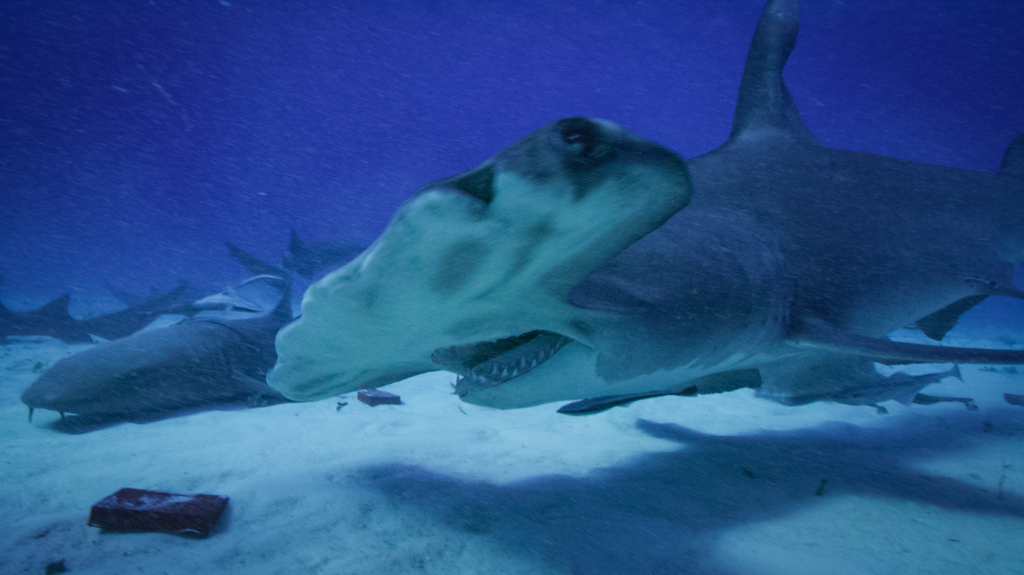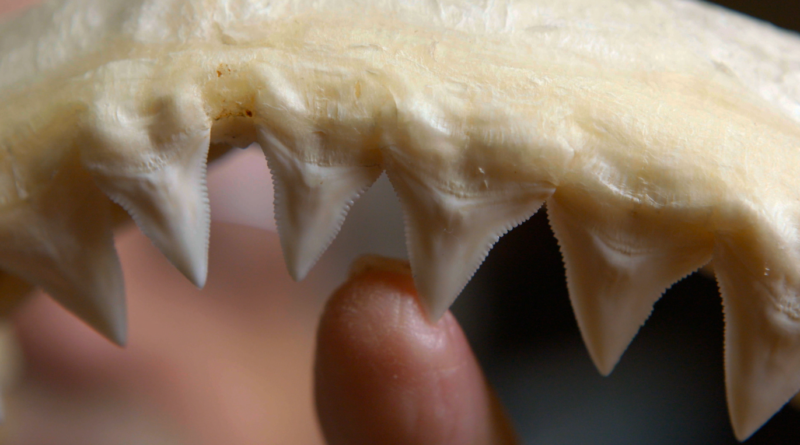INTERVIEW: ‘Sharkfest’ is ready to chomp into your living room for five weeks
Photo: A bull shark’s teeth can cut through just about anything. Learn more on Raging Bull Shark, part of Nat Geo’s Sharkfest 2020. Photo courtesy of National Geographic / Ted Tuel / Provided with permission.
Sharkfest, National Geographic and Nat Geo Wild’s annual festival of shark-related programming, returns Sunday, July 19 with the promise of intense documentaries showcasing the sheer wonder of these ocean-faring beasts. This year’s installment, which continues for five weeks, will feature 17 original specials across both networks.
Fans of Sharkfest can sink their teeth into World’s Biggest Tiger Shark?, premiering Sunday, July 19 at 8 p.m. on National Geographic with an encore presentation on Nat Geo Wild Tuesday, Aug. 11 at 9 p.m. This will be followed by When Sharks Attack, a six-episode series that premieres Monday, July 20 on National Geographic (several encores will air on Nat Geo Wild).
Frances Farabaugh, a marine biologist from Miami, will be featured in Sharks vs. Dolphins: Blood Battle, premiering Monday, July 20 at 10 p.m. on National Geographic with an encore on Nat Geo Wild Sunday, Aug. 9 at 7 p.m. On the special, scientists look at the complex relationship between sharks and dolphins, according to press notes. Their exploring takes them to the aptly named Shark Bay, Australia, to see how the marine animals battle in the water.
For Farabaugh, a native of San Diego who is a graduate of Humboldt State University, there are some unanswered questions that still evade scientists when considering the impact of sharks on the environment.
“I think the biggest question and the most pressing one is what precisely are the ecological roles that sharks play in their various systems,” she said in a recent phone interview with press. “Once we understand the precise role they play in the ecosystem we can learn a lot of things, including what happens when they are gone and how best can we protect and restore them, but I think there’s another side to that coin, which has a lot less to do with understanding sharks and a lot to do with understanding people and systems and society because I think there’s often this misconception that nature is a separate thing from human beings. And we absolutely exist in the natural system, and we are a part of it. So understanding how we as humans can do better at interacting and managing our natural resources and getting the most out of the services they provide us is going to go a long way into marrying these two disparate fields of study, this sociological question and then this ecological question together, to create a future that is sustainable and where we live a little bit better with our planet.”
Joining Farabaugh this year for the shark-related programming is Dr. Mike Heithaus, a marine ecologist who specializes in predator-prey relationships. He is the dean of the College of Arts, Sciences & Education and professor in the Department of Biological Sciences at Florida International University. He also served as the founding executive director of the School of Environment, Arts and Society (SEAS).
For this year’s Sharkfest, Heithaus will be a featured expert on the Sharkcano special, set for Tuesday, July 21 at 10 p.m. on National Geographic (encore Wednesday, Aug. 12 at 7 p.m. on Nat Geo Wild). Plus, he’s also a voice on the documentary Raging Bull Shark, which will premiere Sunday, July 26 at 8 p.m., with an encore Thursday, Aug. 13 at 7 p.m. on Nat Geo Wild.
“To me, the most important thing to know is exactly how important sharks are to healthy ecosystems, what species are important, when are they important and why are they important,” Heithaus said. “I think that those are really important to know because populations are in such trouble, and by understanding not just what they do in ecosystems but what would happen to ecosystems if we lose them will help us develop the right conservation management and strategies.”
Heithaus said he is interested in seeing populations of sharks around the world brought back up to healthy levels; otherwise they will not be able to fulfill their historic ecological roles.
“And luckily I think we’re on the cusp of actually getting some of the tools in the hands of governments and fishers [on] how to best protect sharks and balance having healthy ecosystems,” he said. “I think beyond that I can list a laundry list of just really incredible questions about their biology, their predator-prey interactions, how they feed, where and how they mate. There’s still a lot of basic biology and really neat things that we haven’t even started to [understand], but to me it’s how important they are in the ecosystem that’s at the top of my list.”
Farabaugh has been interested in marine biology for quite some time. Today she takes that lifelong energy and shares scientific information with the public through her blog at the Smithsonian National Museum of Natural History in Washington, D.C. She also serves as a research intern for the Smithsonian Tropical Research Institute in Panama and the Organization for Tropical Studies in Costa Rica.
“For as long as I can remember I have been fascinated by the natural world and the ocean in general,” Farabaugh said. “I was very, very young. I had to have been maybe about 5 years old, and my parents took me to an aquarium. And at the aquarium, they had a kind of ‘swim with the sharks’ experience, and at that point … I was landlocked. I hadn’t spent a lot of time in the ocean, so my first reaction to the water was, ‘Oh, it’s salty, and it stings my eyes. And I’m not sure. This is uncomfortable.’ And then as soon as I opened my eyes, and I was surrounded by these magnificent creatures, my parents couldn’t get me out of the water.”
Another seminal experience for Farabaugh came when she was a teenager living in California, and she was enjoying a summer camp for aspiring marine biologists.
“We were on a boat on the Channel Islands, and we had been in the water all day,” she said. “And the water is quite cold, so everyone is shivering and exhausted. And we were doing a night snorkel, and the boat operators put [on a] light. And all these little worms were attracted to the lights, and then we had squid attracted to the worms and then sea lions attracted to that. And the water was glowing with bioluminescence, and just flying fish were coming up and hitting me in the face. And the ocean was just churning and teeming with life.”
She remembers a camp counselor catching an injured squid and then dissecting it on the pitching deck of the boat. Farabaugh was cold, in the middle of the ocean, with animals all around her — and she felt like she found her true calling in life.
“I just remember thinking I want to do this forever,” Farabaugh said. “It was just the most sublime adventure, and I still get that out of science, about learning new things and traveling to new places and discovering the little hidden bits of knowledge that the ocean is yet to yield up to us.”

Heithaus said he has been “doomed” to become a marine biologist since the tender age of 18 months. His mother took him into the ocean, and apparently he caught a fish … in his diaper. Another hook for the future ecologist came when he watched National Geographic documentaries narrated by David Attenborough. The animals on the television screen were quite different from the cornfields in Ohio where he grew up.
“I want[ed] to be a marine biologist, and I just had a few opportunities to volunteer and get involved,” he said. “I was hooked. It really started from a love of just being on the beach and fish[ing] and seeing what I can. And then here’s where I’m going to lose my shark card probably, but I actually started out really interested in dolphins and had started working on dolphins and realized that to understand what dolphins were doing I might have to know something about sharks.”
He started to research tiger sharks, and when the first one surfaced near hhis boat, he thought this might be the future for him. He instantaneously wanted to know how the species worked with the rest of the ecosystem.
“There’s so much left to learn,” Heithaus said. “For me, now it’s just such a honor to be able to do these documentaries and share that excitement and passion that a previous generation of explorers shared with me to get me excited about it, so hopefully when kids or the public are watching this they realize that sharks aren’t something to just be feared. But they’re magnificent animals, and there’s a huge world left out there to explore. And maybe it will inspire some of them to be the next generation of marine biologists and explorers.”
By John Soltes / Publisher / John@HollywoodSoapbox.com
Sharkfest 2020 begins Sunday, July 19 on National Geographic and continues for five weeks on National Geographic and Nat Geo Wild. Click here for more information.

